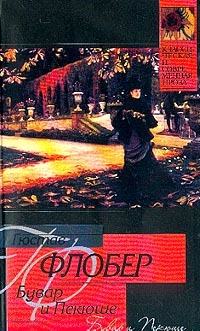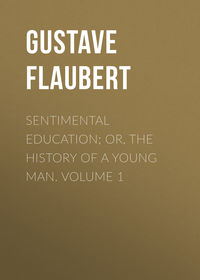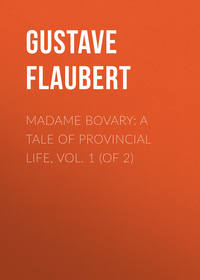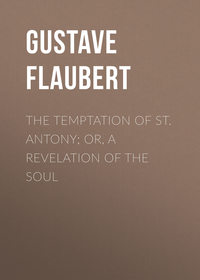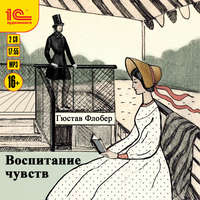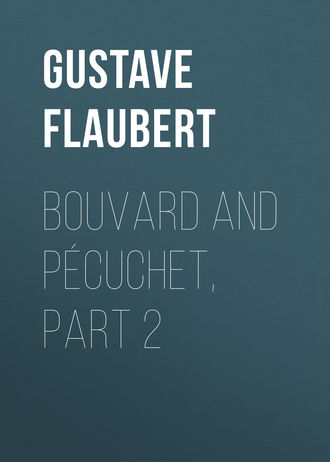 полная версия
полная версияBouvard and Pécuchet, part 2

Gustave Flaubert
Bouvard and Pécuchet, part 2 / A Tragi-comic Novel of Bougeois Life, vol. X
BOUVARD AND PÉCUCHET (CONTINUED.)
CHAPTER IX
Sons of the Church
MARCEL reappeared next day at three o’clock, his face green, his eyes bloodshot, a lump on his forehead, his breeches torn, his breath tainted with a strong smell of brandy, and his person covered with dirt.
He had been, according to an annual custom of his, six leagues away at Iqueville to enjoy a midnight repast with a friend; and, stuttering more than ever, crying, wishing to beat himself, he begged of them for pardon, as if he had committed a crime. His masters granted it to him. A singular feeling of serenity rendered them indulgent.
The snow had suddenly melted, and they walked about the garden, inhaling the genial air, delighted merely with living.
Was it only chance that had kept them from death? Bouvard felt deeply affected. Pécuchet recalled his first commission, and, full of gratitude to the Force, the Cause, on which they depended, the idea took possession of them to read pious works.
The Gospel dilated their souls, dazzled them like a sun. They perceived Jesus standing on a mountain, with one arm raised, while below the multitude listened to Him; or else on the margin of a lake in the midst of the apostles, while they drew in their nets; next on the ass, in the clamour of the “alleluias,” His hair fanned by the quivering palms; finally, lifted high upon the Cross, bending down His head, from which eternally falls a dew of blood upon the world. What won them, what ravished them, was His tenderness for the humble, His defence of the poor, His exaltation of the oppressed; and they found in that Book, wherein Heaven unfolds itself, nothing theological in the midst of so many precepts, no dogma, no requirement, save purity of heart.
As for the miracles, their reason was not astonished by them. They had been acquainted with them from their childhood. The loftiness of St. John enchanted Pécuchet, and better disposed him to appreciate the Imitation.
Here were no more parables, flowers, birds, but lamentations – a compression of the soul into itself.
Bouvard grew sad as he turned over these pages, which seemed to have been written in foggy weather, in the depths of a cloister, between a belfry and a tomb. Our mortal life appeared there so wretched that one must needs forget it and return to God. And the two poor men, after all their disappointments, experienced that need of simple natures – to love something, to find rest for their souls.
They studied Ecclesiastes, Isaiah, Jeremiah.
But the Bible dismayed them with its lion-voiced prophets, the crashing of thunder in the skies, all the sobbings of Gehenna, and its God scattering empires as the wind scatters clouds.
They read it on Sunday at the hour of vespers, while the bell was ringing.
One day they went to mass, and then came back. It was a kind of recreation at the end of the week. The Count and Countess de Faverges bowed to them from the distance, a circumstance which was remarked. The justice of the peace said to them with blinking eyes:
“Excellent! You have my approval.”
All the village dames now sent them consecrated bread. The Abbé Jeufroy paid them a visit; they returned it; friendly intercourse followed; and the priest avoided talking about religion.
They were astonished at this reserve, so much so that Pécuchet, with an assumption of indifference, asked him what was the way to set about obtaining faith.
“Practise first of all.”
They began to practise, the one with hope, the other with defiance, Bouvard being convinced that he would never be a devotee. For a month he regularly followed all the services; but, unlike Pécuchet, he did not wish to subject himself to Lenten fare.
Was this a hygienic measure? We know what hygiene is worth. A matter of the proprieties? Down with the proprieties! A mark of submission towards the Church? He laughed at it just as much; in short, he declared the rule absurd, pharisaical, and contrary to the spirit of the Gospel.
On Good Friday in other years they used to eat whatever Germaine served up to them. But on this occasion Bouvard ordered a beefsteak. He sat down and cut up the meat, and Marcel, scandalised, kept staring at him, while Pécuchet gravely took the skin off his slice of codfish.
Bouvard remained with his fork in one hand, his knife in the other. At length, making up his mind, he raised a mouthful to his lips. All at once his hands began to tremble, his heavy countenance grew pale, his head fell back.
“Are you ill?”
“No. But – ” And he made an avowal. In consequence of his education (it was stronger than himself), he could not eat meat on this day for fear of dying.
Pécuchet, without misusing his victory, took advantage of it to live in his own fashion. One evening he returned home with a look of sober joy imprinted on his face, and, letting the word escape, said that he had just been at confession.
Thereupon they argued about the importance of confession.
Bouvard acknowledged that of the early Christians, which was made publicly: the modern is too easy. However, he did not deny that this examination concerning ourselves might be an element of progress, a leaven of morality.
Pécuchet, desirous of perfection, searched for his vices: for some time past the puffings of pride were gone. His taste for work freed him from idleness; as for gluttony, nobody was more moderate. Sometimes he was carried away by anger.
He made a vow that he would be so no more.
In the next place, it would be necessary to acquire the virtues: first of all, humility, that is to say, to believe yourself incapable of any merit, unworthy of the least recompense, to immolate your spirit, and to place yourself so low that people may trample you under their feet like the mud of the roads. He was far as yet from these dispositions.
Another virtue was wanting in him – chastity. For inwardly he regretted Mélie, and the pastel of the lady in the Louis XV. dress disturbed him by her ample display of bosom. He shut it up in a cupboard, and redoubled his modesty, so much so that he feared to cast glances at his own person.
In order to mortify himself, Pécuchet gave up his little glass after meals, confined himself to four pinches of snuff in the day, and even in the coldest weather he did not any longer put on his cap.
One day, Bouvard, who was fastening up the vine, placed a ladder against the wall of the terrace near the house, and, without intending it, found himself landed in Pécuchet’s room.
His friend, naked up to the middle, first gently smacked his shoulders with the cat-o’-nine-tails without quite undressing; then, getting animated, pulled off his shirt, lashed his back, and sank breathless on a chair.
Bouvard was troubled, as if at the unveiling of a mystery on which he should not have gazed.
For some time he had noticed a greater cleanliness about the floor, fewer holes in the napkins, and an improvement in the diet – changes which were due to the intervention of Reine, the curé’s housekeeper. Mixing up the affairs of the Church with those of her kitchen, strong as a ploughman, and devoted though disrespectful, she gained admittance into households, gave advice, and became mistress in them. Pécuchet placed implicit confidence in her experience.
On one occasion she brought to him a corpulent man with narrow eyes like a Chinaman, and a nose like a vulture’s beak. This was M. Gouttman, a dealer in pious articles. He unpacked some of them shut up in boxes under the cart-shed: a cross, medals, and beads of all sizes; candelabra for oratories, portable altars, tinsel bouquets, and sacred hearts of blue pasteboard, St. Josephs with red beards, and porcelain crucifixes. The price alone stood in his way.
Gouttman did not ask for money. He preferred barterings; and, having gone up to the museum, he offered a number of his wares for their collection of old iron and lead.
They appeared hideous to Bouvard. But Pécuchet’s glance, the persistency of Reine, and the bluster of the dealer were effectual in making him yield.
Gouttman, seeing him so accommodating, wanted the halberd in addition; Bouvard, tired of having exhibited its working, surrendered it. The entire valuation was made. “These gentlemen still owed a hundred francs.” It was settled by three bills payable at three months; and they congratulated themselves on a good bargain.
Their acquisitions were distributed through the various rooms. A crib filled with hay and a cork cathedral decorated the museum.
On Pécuchet’s chimney-piece there was a St. John the Baptist in wax; along the corridor were ranged the portraits of episcopal dignitaries; and at the bottom of the staircase, under a chained lamp, stood a Blessed Virgin in an azure mantle and a crown of stars. Marcel cleaned up those splendours, unable to imagine anything more beautiful in Paradise.
What a pity that the St. Peter was broken, and how nicely it would have done in the vestibule!
Pécuchet stopped sometimes before the old pit for composts, where he discovered the tiara, one sandal, and the tip of an ear; allowed sighs to escape him, then went on gardening, for now he combined manual labour with religious exercises, and dug the soil attired in the monk’s habit, comparing himself to Bruno. This disguise might be a sacrilege. He gave it up.
But he assumed the ecclesiastical style, no doubt owing to his intimacy with the curé. He had the same smile, the same tone of voice, and, like the priest too, he slipped both hands with a chilly air into his sleeves up to the wrists. A day came when he was pestered by the crowing of the cock and disgusted with the roses; he no longer went out, or only cast sullen glances over the fields.
Bouvard suffered himself to be led to the May devotions. The children singing hymns, the gorgeous display of lilacs, the festoons of verdure, had imparted to him, so to speak, a feeling of imperishable youth. God manifested Himself to his heart through the fashioning of nests, the transparency of fountains, the bounty of the sun; and his friend’s devotion appeared to him extravagant, fastidious.
“Why do you groan during mealtime?”
“We ought to eat with groans,” returned Pécuchet, “for it was in that way that man lost his innocence” – a phrase which he had read in the Seminarist’s Manual, two duodecimo volumes he had borrowed from M. Jeufroy: and he drank some of the water of La Salette, gave himself up with closed doors to ejaculatory prayers, and aspired to join the confraternity of St. Francis.
In order to obtain the gift of perseverance, he resolved to make a pilgrimage in honour of the Blessed Virgin. He was perplexed as to the choice of a locality. Should it be Nôtre Dame de Fourviers, de Chartres, d’Embrun, de Marseille, or d’Auray? Nôtre Dame de la Délivrande was nearer, and it suited just as well.
“You will accompany me?”
“I should look like a greenhorn,” said Bouvard.
After all, he might come back a believer; he did not object to being one; and so he yielded through complaisance.
Pilgrimages ought to be made on foot. But forty-three kilometers would be trying; and the public conveyances not being adapted for meditation, they hired an old cabriolet, which, after a twelve hours’ journey, set them down before the inn.
They got an apartment with two beds and two chests of drawers, supporting two water-jugs in little oval basins; and “mine host” informed them that this was “the chamber of the Capuchins” under the Terror. There La Dame de la Délivrande had been concealed with so much precaution that the good fathers said mass there clandestinely.
This gave Pécuchet pleasure, and he read aloud a sketch of the history of the chapel, which had been taken downstairs into the kitchen.
It had been founded in the beginning of the second century by St. Régnobert, first bishop of Lisieux, or by St. Ragnebert, who lived in the seventh, or by Robert the Magnificent in the middle of the eleventh.
The Danes, the Normans, and, above all, the Protestants, had burnt and ravaged it at various epochs. About 1112, the original statue was discovered by a sheep, which indicated the place where it was by tapping with its foot in a field of grass; and on this spot Count Baudouin erected a sanctuary.
“ ‘Her miracles are innumerable. A merchant of Bayeux, taken captive by the Saracens, invoked her: his fetters fell off, and he escaped. A miser found a nest of rats in his corn loft, appealed to her aid, and the rats went away. The touch of a medal, which had been rubbed over her effigy, caused an old materialist from Versailles to repent on his death-bed. She gave back speech to Sieur Adeline, who lost it for having blasphemed; and by her protection, M. and Madame de Becqueville had sufficient strength to live chastely in the married state.
“ ‘Amongst those whom she cured of irremediable diseases are mentioned Mademoiselle de Palfresne, Anne Lirieux, Marie Duchemin, François Dufai, and Madame de Jumillac née d’Osseville.
“ ‘Persons of high rank have visited her: Louis XI., Louis XIII., two daughters of Gaston of Orléans, Cardinal Wiseman, Samirrhi, patriarch of Antioch, Monseigneur Véroles, vicar apostolic of Manchuria; and the Archbishop of Quelen came to return thanks to her for the conversion of Prince Talleyrand.’ ”
“She might,” said Pécuchet, “convert you also!”
Bouvard, already in bed, gave vent to a species of grunt, and presently was fast asleep.
Next morning at six o’clock they entered the chapel.
Another was in course of construction. Canvas and boards blocked up the nave; and the monument, in a rococo style, displeased Bouvard, above all, the altar of red marble with its Corinthian pilasters.
The miraculous statue, in a niche at the left of the choir, was enveloped in a spangled robe. The beadle came up with a wax taper for each of them. He fixed it in a kind of candlestick overlooking the balustrade, asked for three francs, made a bow, and disappeared.
Then they surveyed the votive offerings. Inscriptions on slabs bore testimony to the gratitude of the faithful. They admired two swords in the form of a cross presented by a pupil of the Polytechnic School, brides’ bouquets, military medals, silver hearts, and in the corner, along the floor, a forest of crutches.
A priest passed out of the sacristy carrying the holy pyx.
When he had remained for a few minutes at the bottom of the altar, he ascended the three steps, said the Oremus, the Introit, and the Kyrie, which the boy who served mass recited all in one breath on bended knees.
The number present was small – a dozen or fifteen old women. The rattling of their beads could be heard accompanying the noise of a hammer driving in stones. Pécuchet bent over his prie-dieu and responded to the “Amens.” During the elevation, he implored Our Lady to send him a constant and indestructible faith. Bouvard, in a chair beside him, took up his Euchology, and stopped at the litany of the Blessed Virgin.
“Most pure, most chaste, most venerable, most amiable, most powerful – Tower of ivory – House of gold – Gate of the morning.”
These words of adoration, these hyperboles drew him towards the being who has been the object of so much reverence. He dreamed of her as she is represented in church paintings, above a mass of clouds, cherubims at her feet, the Infant Jesus on her breast – Mother of tendernesses, upon whom all the sorrows of the earth have a claim – ideal of woman carried up to heaven; for man exalts that love arising out of the depths of the soul, and his highest aspiration is to rest upon her heart.
The mass was finished. They passed along by the dealers’ sheds which lined the walls in front of the church. They saw there images, holy-water basins, urns with fillets of gold, Jesus Christs made of cocoanuts, and ivory chaplets; and the sun brought into prominence the rudeness of the paintings, the hideousness of the drawings. Bouvard, who had some abominable specimens at his own residence, was indulgent towards these. He bought a little Virgin of blue paste. Pécuchet contented himself with a rosary as a memento.
The dealers called out: “Come on! come on! For five francs, for three francs, for sixty centimes, for two sous, don’t refuse Our Lady!”
The two pilgrims sauntered about without making any selections from the proffered wares. Uncomplimentary remarks were made about them.
“What is it they want, these creatures?”
“Perhaps they are Turks.”
“Protestants, rather.”
A big girl dragged Pécuchet by the frock-coat; an old man in spectacles placed a hand on his shoulder; all were bawling at the same time; and a number of them left their sheds, and, surrounding the pair, redoubled their solicitations and effronteries.
Bouvard could not stand this any longer.
“Let us alone, for God’s sake!”
The crowd dispersed. But one fat woman followed them for some distance, and exclaimed that they would repent of it.
When they got back to the inn they found Gouttman in the café. His business called him to these quarters, and he was talking to a man who was examining accounts at a table.
This person had a leather cap, a very wide pair of trousers, a red complexion, and a good figure in spite of his white hair: he had the appearance at the same time of a retired officer and an old strolling player.
From time to time he rapped out an oath; then, when Gouttman replied in a mild tone, he calmed down at once and passed to another part of the accounts.
Bouvard who had been closely watching him, at the end of a quarter of an hour came up to his side.
“Barberou, I believe?”
“Bouvard!” exclaimed the man in the cap, and they embraced each other.
Barberou had in the course of twenty years experienced many changes of fortune. He had been editor of a newspaper, an insurance agent, and manager of an oyster-bed.
“I will tell you all about it,” he said.
At last, having returned to his original calling, he was travelling for a Bordeaux house, and Gouttman, who took care of the diocese, disposed of wines for him to the ecclesiastics. “But,” he hurriedly added, “you must pardon me one minute; then I shall be at your service.”
He was proceeding with the examination of the accounts, and all of a sudden he jumped up excitedly.
“What! two thousand?”
“Certainly.”
“Ha! it’s wrong, that’s what it is!”
“What do you say?”
“I say that I’ve seen Hérambert myself,” replied Barberou in a passion. “The invoice makes it four thousand. No humbug!”
The dealer was not put out of countenance.
“Well, it discharges you – what next?”
Barberou, as he stood there with his face at first pale and then purple, impressed Bouvard and Pécuchet with the apprehension that he was about to strangle Gouttman.
He sat down, folded his arms, and said:
“You are a vile rascal, you must admit.”
“No insults, Monsieur Barberou. There are witnesses. Be careful!”
“I’ll bring an action against you!”
“Ta! ta! ta!” Then having fastened together his books, Gouttman lifted the brim of his hat: “I wish you luck on’t!” With these words he went off.
Barberou explained the facts: For a credit of a thousand francs doubled by a succession of renewals with interest, he had delivered to Gouttman three thousand francs’ worth of wines. This would pay his debt with a profit of a thousand francs; but, on the contrary, he owed three thousand on the transaction! His employers might dismiss him; they might even prosecute him!
“Blackguard! robber! dirty Jew! And this fellow dines at priests’ houses! Besides, everything that touches the clerical headpiece – ”
And he went on railing against the priests, and he struck the table with such violence that the little statue was near falling.
“Gently!” said Bouvard.
“Hold on! What’s this here?” And Barberou having removed the covering of the little Virgin: “A pilgrimage bauble! Yours?”
“ ’Tis mine,” said Pécuchet.
“You grieve me,” returned Barberou; “but I’ll give you a wrinkle on that point. Don’t be afraid.” And as one must be a philosopher, and as there is no use in fretting, he invited them to come and lunch with him.
The three sat down together at table.
Barberou was agreeable, recalled old times, took hold of the maid-servant’s waist, and wished to measure the breadth of Bouvard’s stomach. He would soon see them again, and would bring them a droll book.
The idea of his visit was rather pleasant to them. They chatted about it in the omnibus for an hour, while the horse was trotting. Then Pécuchet shut his eyes. Bouvard also relapsed into silence. Internally he felt an inclination towards religion.
“M. Marescot had the day before called to make an important communication” – Marcel knew no more about it.
They did not see the notary till three days after; and at once he explained the matter.
Madame Bordin offered to buy the farm from M. Bouvard, and to pay him seven thousand five hundred francs a year.
She had been casting sheep’s eyes on it since her youth, knew the boundaries and lands all around it, its defects and its advantages; and this desire consumed her like a cancer.
For the good lady, like a true Norman, cherished above everything landed estate, less for the security of the capital than for the happiness of treading on soil that belonged to herself. In that hope she had devoted herself to inquiries and inspections from day to day, and had practised prolonged economies; and she waited with impatience for Bouvard’s answer.
He was perplexed, not desiring that Pécuchet one day should be fortuneless; but it was necessary to seize the opportunity – which was the result of the pilgrimage, for the second time Providence had shown itself favourable to them. They proposed the following conditions: An annual payment, not of seven thousand five hundred francs, but of six thousand francs, provided it should pass to the survivor.
Marescot made the point that one of them was in delicate health. The constitution of the other gave him an apoplectic tendency. Madame Bordin, carried away by her ruling passion, signed the contract.
Bouvard got into a melancholy frame of mind about it. Somebody might desire his death; and this reflection inspired him with serious thoughts, ideas about God and eternity.
Three days after, M. Jeufroy invited them to the annual dinner which it was his custom to give to his colleagues. The dinner began at two o’clock in the afternoon, and was to finish at eleven at night.
Perry was used at it as a beverage, and puns were circulated. The Abbé Pruneau, before they broke up, composed an acrostic; M. Bougon performed card-tricks; and Cerpet, a young curate, sang a little ballad which bordered on gallantry.
The curé frequently came to see them. He presented religion under graceful colours. And, after all, what risk would they run? So Bouvard expressed his willingness to approach the holy table shortly, and Pécuchet was to participate in the sacrament on the same occasion.
The great day arrived. The church, on account of the first communions, was thronged with worshippers. The village shopkeepers and their womenfolk were crowded close together in their seats, and the common people either remained standing up behind or occupied the gallery over the church door.
What was about to take place was inexplicable – so Bouvard reflected; but reason does not suffice for the comprehension of certain things. Great men have admitted that. Let him do as much as they had done; and so, in a kind of torpor, he contemplated the altar, the censer, the tapers, with his head a little light, for he had eaten nothing, and experienced a singular weakness.
Pécuchet, by meditating on the Passion of Jesus Christ, excited himself to outbursts of love. He would have liked to offer his soul up to Him as well as the souls of others – and the ecstasies, the transports, the illumination of the saints, all beings, the entire universe. Though he prayed with fervour, the different parts of the mass seemed to him a little long.
At length the little boys knelt down on the first step of the altar, forming with their coats a black band, above which rose light or dark heads of hair at unequal elevations. Then the little girls took their places, with their veils falling from beneath their wreaths. From a distance they resembled a row of white clouds at the end of the choir.


